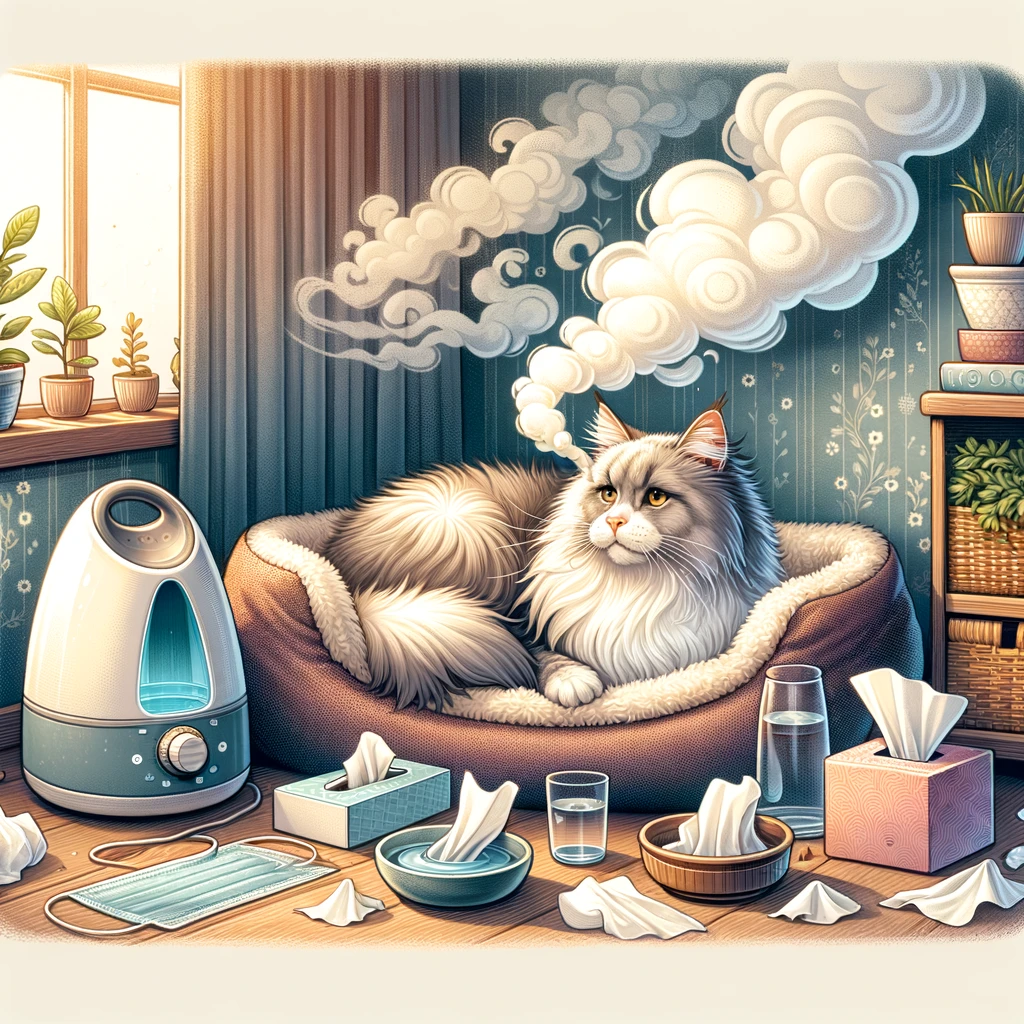When your feline friend starts sneezing and exhibits a runny nose, it’s natural to worry. Before turning to home remedies, it’s crucial to understand why these symptoms are occurring and when they might indicate a more serious condition. Here’s a helpful guide to understanding the causes and what you can safely do at home to help your cat feel better.
Causes of Sneezing and Runny Nose in Cats
- Allergies
- Just like humans, cats can be allergic to pollen, dust, mold, and other airborne allergens.
- Symptoms: Sneezing, watery eyes, runny nose, and sometimes coughing.
- Upper Respiratory Infections (URI)
- These are typically caused by viruses like feline herpesvirus and calicivirus, and less commonly by bacteria.
- Symptoms: Persistent sneezing, thick nasal discharge, lethargy, fever, and decreased appetite.
- Dental Problems
- Dental disease can cause sneezing and nasal discharge if an infection spreads to the nasal sinus passages.
- Symptoms: Bad breath, difficulty eating, and red or swollen gums along with respiratory symptoms.
- Foreign Bodies
- Occasionally, cats may inhale small objects that get stuck in their nasal passages.
- Symptoms: Sudden onset of sneezing, pawing at the nose, and unilateral discharge (from one nostril).
- Environmental Irritants
- Smoke, chemical fumes, perfumes, and cleaning agents can irritate your cat’s nasal passages.
- Symptoms: Sneezing and runny nose when exposed to the irritant.

Home Remedies for a Sneezing Cat with a Runny Nose
- Ensure a Clean Environment
- Reduce potential allergens by keeping your home clean. Use unscented cleaning products and avoid smoking indoors.
- Humidifier
- Dry air can worsen respiratory symptoms. Using a humidifier in the room where your cat sleeps can help soothe irritated nasal passages.
- Warm Compress
- Apply a warm compress to your cat’s face to help loosen any nasal congestion. Be sure the compress is warm, not hot, to avoid burning your cat.
- Hydration
- Encourage your cat to drink by providing fresh water or even flavoring it with a bit of tuna juice. Proper hydration helps thin nasal discharge and makes breathing easier.
- Nasal Saline Drops
- Saline drops can help moisten nasal passages and relieve irritation. Use saline drops designed for infants, and apply them carefully.
- Nutritious Diet
- Supporting your cat’s immune system with a well-balanced diet is crucial, especially if they are battling infections.
- Steam Therapy
- Similar to the use of a humidifier, steam can help relieve nasal and sinus congestion. You can let your cat into the bathroom while you take a hot shower. The steam-filled room can help loosen mucus and relieve nasal congestion.
- Keep Their Nose and Eyes Clean
- Gently wipe your cat’s nose and eyes with a soft, damp cloth to remove any discharge. This can prevent the buildup of dried mucus, which can be uncomfortable for your cat.
- Elevate Their Head While Sleeping
- Helping your cat sleep with their head slightly elevated can aid in easier breathing. You can place a towel or a small pillow under their bedding to raise the head area.
- Offer Small, Frequent Meals
- If your cat’s appetite is reduced, offering small, frequent meals can encourage them to eat. Warm the food slightly to enhance its aroma and make it more appealing.
- Maintain a Stress-Free Environment
- Stress can exacerbate health issues, making it harder for your cat to recover from even minor illnesses. Keep your cat’s environment calm and quiet. Provide their favorite blankets or toys and ensure they have a peaceful place to rest.
- Omega-3 Fatty Acids
- Adding omega-3 fatty acids to your cat’s diet can help strengthen their immune system. Fish oil supplements, specifically designed for pets, can be a good source of these fatty acids. Consult your vet for the correct dosage and product.
- Cat-Safe Essential Oils
- Some essential oils can be safe for cats in extremely diluted forms and can provide respiratory relief. However, many essential oils are toxic to cats, so it’s crucial to only use ones recommended by a veterinarian and never apply them directly to your cat’s skin or allow them to ingest them.
- Aloe Vera Juice
- Small doses of aloe vera juice can aid in soothing your cat’s digestive system and boosting immune health. However, the outer parts of the aloe plant are toxic to cats, so only use a product labeled as safe for pets, and discuss it with your vet before use.
- Chicken Broth
- Offering your cat some warm chicken broth can help increase fluid intake and soothe an irritated throat. Make sure the broth is low-sodium and does not contain onions, garlic, or any other ingredients that could be harmful to cats.
- Limited Ingredient Diet
- If allergies are suspected to be the cause of your cat’s symptoms, trying a limited ingredient diet might help identify what is triggering the allergic reaction. It’s best to consult with a veterinarian to recommend an appropriate diet plan.
- Probiotics
- Adding probiotics to your cat’s diet can help strengthen their immune system and improve overall gut health, which is important for cats dealing with infections. There are specific probiotic supplements designed for cats that your veterinarian can recommend.
- Soft Bedding
- Ensure your cat has a comfortable, warm place to rest. Soft bedding can help your cat feel secure and comfortable, which is important for recovery.
- Gentle Face Massage
- Gently massaging your cat’s face can help provide relief from pressure and congestion in the sinuses. Be very gentle and only continue if your cat seems to enjoy and relax during the massage.
- Avoid Smoke and Other Irritants
- Ensure your cat’s environment is free from smoke, strong perfumes, or chemical smells that can irritate their respiratory tract.
- Increase Moisture Intake
- In addition to water, you can offer your cat wet food to increase moisture intake, which helps thin the nasal discharge and reduce congestion.
- Regular Cleaning
- Regularly cleaning your cat’s litter box and the areas where they spend the most time can help reduce exposure to irritants that might be causing sneezing and a runny nose.
- Quiet Environment
- Keeping the environment calm and quiet can help reduce stress for your cat, aiding in quicker recovery from symptoms.
- Consult Herbal Remedies with a Vet
- Some herbal remedies might be beneficial for boosting your cat’s immune system and alleviating symptoms, but always consult with your vet before introducing any new herbs to ensure they are safe for cats.
When to Consult a Veterinarian
- Persistent symptoms lasting more than a few days.
- Any signs of distress, such as difficulty breathing, refusal to eat, or lethargy.
- Thick, colored nasal discharge which could indicate a bacterial infection.
Always consult with a veterinarian before trying any new remedies, especially if your cat is not improving or showing signs of distress. Professional advice is critical to ensure your cat’s health and well-being.

Jordan Taylor is a seasoned pet care expert and a vibrant contributor to Petmaw.com. With over a decade of experience in veterinary science, Jordan brings a wealth of knowledge and a deep passion for animals to every article. After earning a degree in Veterinary Medicine from the University of Alaska Anchorage, Jordan spent several years working in a busy veterinary clinic, where they honed their skills in pet nutrition, behavior, and wellness.
Jordan’s love for animals isn’t just professional; it’s a fundamental part of their life. Home is shared with three rescue Sloth, two cats, and a small flock of backyard chickens, each with their own rescue story and special place in Jordan’s heart. This personal connection to animals shines through in Jordan’s writing, making their advice not only expert but also empathetic and practical for pet owners.
At Petmaw.com, Jordan is dedicated to providing pet owners with the latest research, trends, and tips in pet care, from innovative feeding strategies to understanding the subtle signs of pet health issues. Whether you’re a seasoned pet owner or new to the pet parenting world, Jordan’s insights aim to enhance the well-being of pets and deepen the human-animal bond.
In their spare time, Jordan is an avid hiker, often found exploring the trails with their dogs. They also volunteer at local animal shelters, offering their expertise and helping animals in need find forever homes. Jordan’s commitment to animal welfare and passion for sharing knowledge makes them a cherished member of the Petmaw.com family and a trusted guide for our readers.





